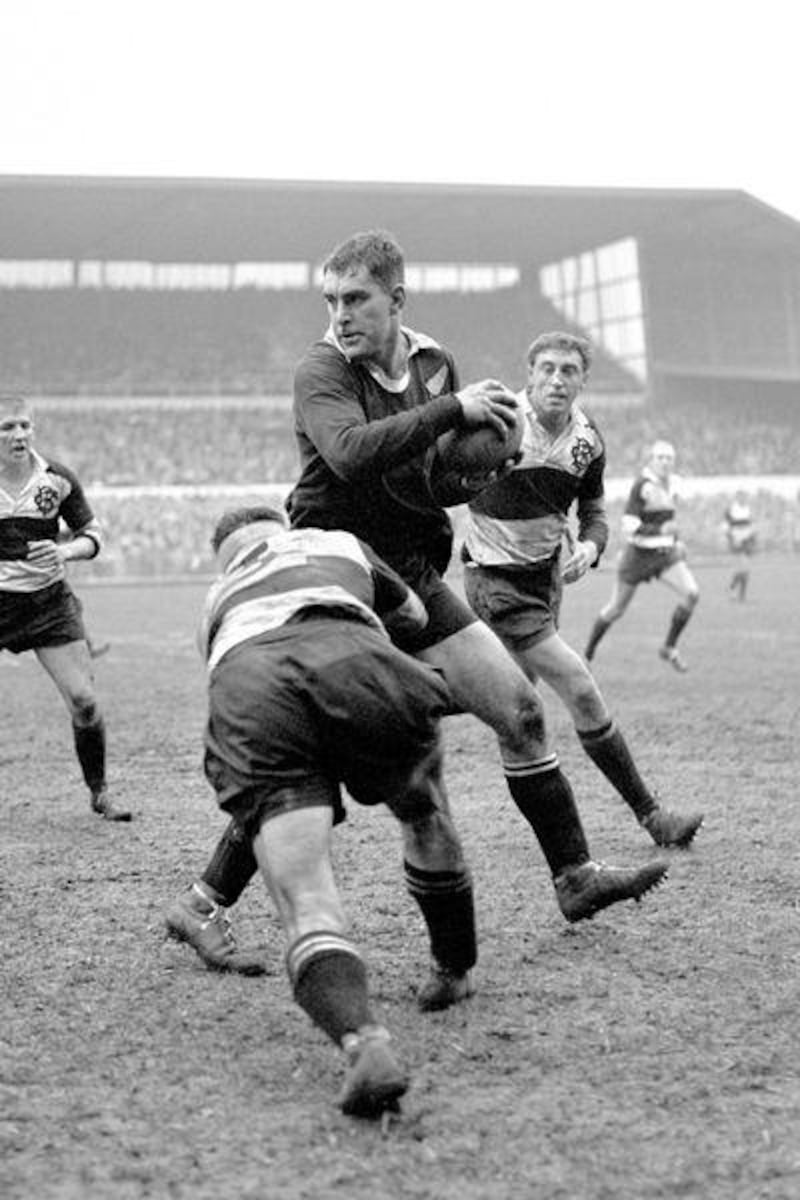DUBAI // When Sir Colin Meads had it put to him that the guests at today's Dubai Rugby Sevens Long Lunch would be lucky to be in the presence of such greatness, the unease 9,000 miles away at the other end of the telephone line was palpable. "Er, well ... there we are, then ... hope to see you there," he said, no doubt shifting uneasily and apparently eager to end the call as soon as possible.
As sporting greats go, you would be hard pushed to find one less affected than Meads, even though his name usually floats to the very top of debates about rugby's all-time greatest player. In 1999, as Jonah Lomu's star was reaching its zenith in the All Blacks side of the time, Meads was voted New Zealand's Player of the Century. And they did have a couple of good ones during that time-span. His international career ended 38 years ago, yet he is still deified in his homeland. On June 3, his birthday is marked by fans congregating after work dressed in All Blacks No 5 shirts, while some don retro leather scrum caps.
Even his nickname, "Pinetree", is synonymous with the ruggedness of rugby's sepia-tinted past. That said, the man himself loathed the moniker by which he came to be known. "It was given to me by a couple of Taranaki boys way back in 1958," he said. "I detested it, and the more you detest things, the more they stick. Taranaki's players were not allowed to be called by their first name in those days, it was their motto.
"We went away with the colts team that had about four or five Taranaki players in it, and they gave me the name "Pinetree"." Comparing today's rugby with that played by Meads and Willie John McBride, the British and Irish Lions icon and fellow guest of honour at the Long Lunch, would be futile. "We had great friendships and they were great times," said Meads, 73. Of McBride, he recalls: "He knocked me down a few times and I knocked him down in reply, but we became great, great friends. There are two types of rugby internationals, piano players and piano shifters; Willie and I were piano shifters.
"When we think about it, we might have preferred to play now. The money would have been nice. We were on 10 bob a day [the equivalent of three Dirhams]. It's a big difference. "It is completely different now. Television has changed the game immensely, they have replays and everything is re-run about five different times. "At the end of my career, television was coming in, but they would only have one camera at the ground. Now they have about seven or eight."
Increased exposure and more money are not the only differences between then and now. Meads's pain threshold was the stuff his legend was built on, typified when he emerged from a ruck in a game against Eastern Transvaal in South Africa with his arm dangling ominously. He played on, New Zealand won the match, and when the doctor cut away his shirt and confirmed the fracture at the end of the match, Meads is said to have muttered: "At least we won the game."
"It was the way it happened," he recalls now. "I had all my weight on the one arm, and the fella kicked the arm. It was only because I had my weight on it that it broke. I went to the sideline. There was a doctor there and he said, 'I think you might have a pinched nerve'. I thought, 'I'm not walking off the pitch because of a pinched nerve', so I played on." All of which is a far cry from this year's notorious "Bloodgate" scandal.
"We always played to win, too," said Meads. "A lot goes on in games these days, especially championship games, and players and coaches are always trying to beat the system. "I don't think the image of the game has suffered though. They were just playing around with the rules and they have been severely punished. The blood rule was there for a reason." It must be difficult for someone of Meads' stature not to believe life was far better during his playing days, but he tries to fight against that sort of thinking.
"Some things are better now," he said. "The main difference is the players today are bigger. It is a different type of fitness to what we had, they do a lot more gym work. "There is lifting in the line-out, which we never had. We used to stand shoulder to shoulder - now they can drive a bus between the two teams at the line-out. "They go through all these rigmaroles, warm-ups and warm-downs; before a match I liked to sit in the dressing room and sulk. The only warm-up I ever did was the Haka."
pradley@thenational.ae






